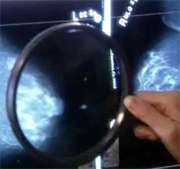(HealthDay)—The risks of developing an ipsilateral breast event (IBE) and an invasive IBE increased over time for patients with ductal carcinoma in situ (DCIS) who were selected on the basis of favorable clinical and pathologic characteristics for surgical excision without radiation, according to a study published online Sept. 14 in the Journal of Clinical Oncology.
Lawrence J. Solin, M.D., from the Albert Einstein Healthcare Network in Philadelphia, and colleagues determined the 12-year risk of developing an IBE for women with DCIS of the breast treated with surgical excision (lumpectomy) without radiation. They conducted a prospective clinical trial for women selected for low-risk clinical and pathologic characteristics. Cohort 1 consisted of low- or intermediate-grade DCIS, tumor size 2.5 cm or smaller (n = 561), while cohort 2 had high-grade DCIS, tumor size 1 cm or smaller (n = 104). An IBE was defined as local recurrence of DCIS or invasive carcinoma in the treated breast.
The researchers found that there were 99 IBEs, of which 52 percent were invasive. In both cohorts the IBE and invasive IBE rates increased over time. The 12-year rates of developing an IBE were 14.4 percent and 24.6 percent in cohorts 1 and 2, respectively (P = 0.003), and the rates of developing an invasive IBE were 7.5 percent and 13.4 percent, respectively (P = 0.08). Study cohort and tumor size were both associated with developing an IBE (P = 0.009 and P = 0.03, respectively) after multivariable analysis.
"For patients with DCIS selected for favorable clinical and pathologic characteristics and treated with excision without radiation, the risks of developing an IBE and an invasive IBE increased through 12 years of follow-up, without plateau," conclude the authors.
Several authors report financial ties to the pharmaceutical and diagnostics industries.
More information:
Abstract
Full Text (subscription or payment may be required)
Journal information: Journal of Clinical Oncology
Copyright © 2015 HealthDay. All rights reserved.





















